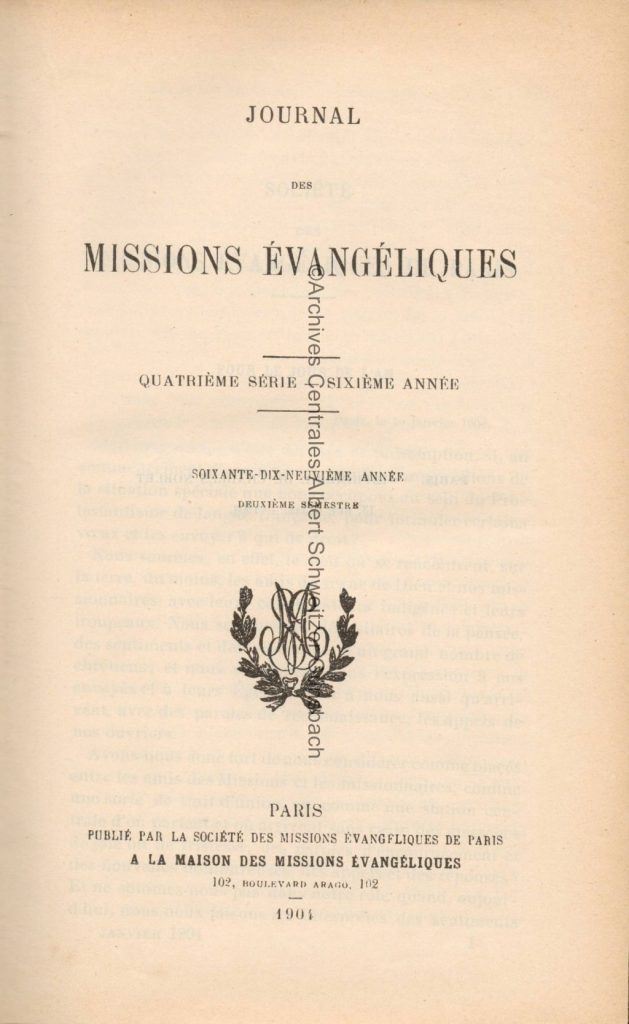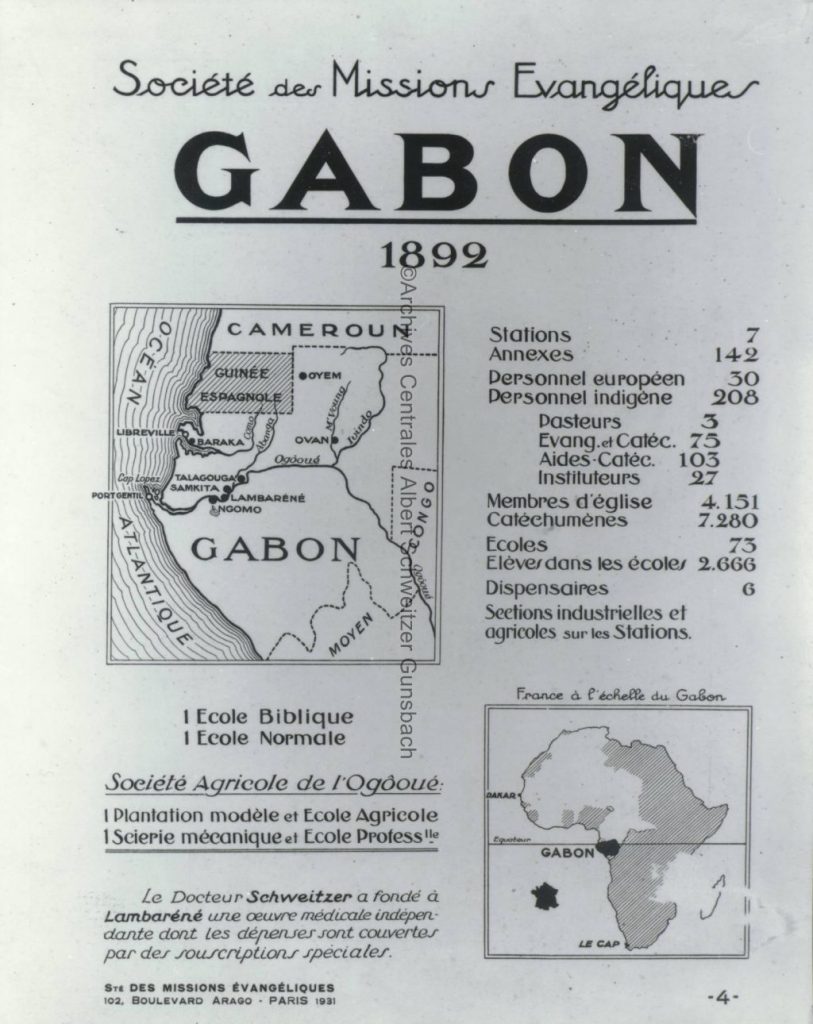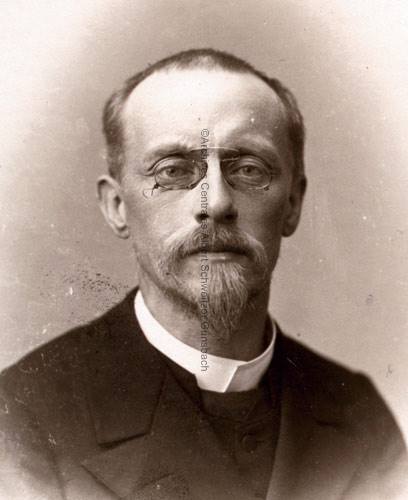One morning, in the autumn of 1904, I found on my desk at Saint Thomas Seminary one of those green brochures in which the Society of Evangelical Missions in Paris reported each month on its activities. […] My eye fell on an article entitled: The needs of the Congo Mission. It was signed by Alfred Boegner, an Alsatian who headed the Missions Society in Paris; in it he lamented the fact that the Mission lacked the personnel to continue its work in Gabon, in the north of the Congo. The article expressed the hope that this appeal would persuade “those on whom the Master’s gaze is already focused” to offer themselves for this urgent task. It ended as follows: “It is men like these who respond simply to a sign from the Master: Lord, here I am, that the Church needs.
Out of My Life and Thought

Needs of the Congo Mission
God has just called back to Himself a modest and faithful servant of our work. Henry Chapuis, an artisan-missionary in the Congo, was taken from us on 6 May in Geneva.
He was born on 20 April 1876 and trained as a locksmith. A member of the Free Church and a friend of Ivan Mercier, he offered himself first in 1897, then in February 1901, for the work of the Missions. That same year, in October, he was accepted; in the months that followed he completed his preparation by various apprenticeships. His destination was uncertain for some time. He himself had thought of the Zambezi and, for a time, Madagascar; in the end, it was the Congo that was chosen for his services. He embarked on 15 December 1901 at Bordeaux and since then he has provided the mission with the most faithful and devoted services.
In all the stations where he was employed, his work and character were highly appreciated by our missionaries. His last assignment was at the Talagouga station. It was there that he felt the effects of the fever and, in the early months of this year, the need to repatriate became apparent.
His wife, who at first had been detained in Geneva by a newborn child, joined him after a few months. She was only able to share his missionary life for a short time; in early 1903, she had to return to Europe, a year before her husband.
Mr Chapuis had arrived in Geneva at the end of March, and there was every reason to hope that he would make a full recovery. At an evening party given by the Geneva Auxiliary Committee to mark the visit of Mr Élisée Escande, Mr Chaponnière complimented Mr Chapuis on the return of his strength, and our friend did not disagree. Unfortunately his recovery was far from complete. On 3 May last, Henry Chapuis opened the boxes of curios he had brought back from the Congo. The same day he felt very ill; soon the symptoms of haematuric fever set in: the doctors called in tried in vain to curb the illness. On Friday 6th our friend breathed his last. His young wife and two children were with him. The following day, Sunday, the friends of the Missions of Geneva paid their last respects to our brother and Mr Chaponnière expressed, on behalf of our Committee, the regrets of the whole Society of the Missions.
We are sure we speak for all of us in assuring Mrs Chapuis of the deep and affectionate sympathy of all friends of the Missions for her and her bereaved children.
This sympathy also goes to the Congo mission, which has been so painfully affected by the death of our friend. It comes at a time when the work is particularly weakened. An attack of bilious fever has just forced Madame Couve, shortly after the birth of her second child, to leave for Europe, accompanied by her husband and Mademoiselle Galley. The travellers arrived in Bordeaux last Monday, 23 May. The crossing restored the strength of Madame Couve, who is currently convalescing. But how sad it was for our friends, on returning to France, to be greeted by the news of the death of their humble and valiant colleague Mr Chapuis! A dispatch and a letter received yesterday and this morning express all the pain and anxiety that our friends in the Congo feel for their work, which has been so deeply affected and which will be further weakened by the departures that have already taken place or are about to take place.
Mr Rambaud and Mr Hermann, currently in charge of the Sam-Kita post, have in fact reached the end of their three-year period and prudence dictates that they be repatriated without delay. Finally, Mr Allégret, who had offered to leave immediately, has been detained in Europe by the doctors’ verdict.
What is to be done in these circumstances? Mr Faure, who has been on leave for almost a year, has made himself available to the Committee, but personal circumstances will keep him away until September. He will not be able to arrive at his post until the beginning of October. A letter that arrived two days ago from Lessouto also announces that Mr René Ellenberger has regained most of his strength and is ready to return to the Congo. He plans to leave in August and will also arrive on the banks of the Ogooué in October.

Lastly, Miss Reboul, a missionary school teacher, and Mrs Lantz, who had never given up on actively serving the mission, and who has just completed her training with a medical apprenticeship, are also ready to leave.
As a new element to be incorporated into the Congo mission, we currently have only one man, Mr Bonnet, a missionary craftsman, whose services have just been approved, and who could be sent to the Congo, with his young wife, at the earliest opportunity.
Everyone will understand that this is insufficient reinforcement. In addition to the new and old auxiliaries who will be leaving, in addition to the missionaries who will be returning to their posts, fresh forces must be added to the small army fighting on the banks of the Ogooué. Where are these fresh forces to be found?
There are indeed young men at Mission House who are doing the Committee’s bidding, ready to respond to its call. But none of them have completed their training, and experience has taught us how serious it is to deprive a future servant of the missionary work of some of the weapons provided by the full course of his theological and practical studies.

In this situation, the Committee resolved to turn to our Churches and theological faculties. When, in an act of faith and obedience, our Society accepted responsibility for the work in Madagascar, it declared that it was confidently expecting Protestantism to provide the extra men that this new work required. The House of Missions has just sent four of its pupils to Madagascar. We therefore feel that we are on the right track when we ask our churches and our schools of theology for the reinforcements that the Congo needs. The Faculty of Montauban has given us Daniel Couve and Edouard Rambaud; that of Geneva has given us Mr Bion; the pastorate has given us Mr Gall, who was recently taken from us by an untimely death.
Who will take the place left by Mr Gall in our stations? Who is the young pastor, the student who has completed his training, who will want to bring to our brothers in the Congo the support of his strength and his youth?
We place this appeal on the hearts of those who will read it. May the Spirit of God himself make it penetrate people’s consciences and transform it into precise and individual vocations for those on whom the Master’s gaze is already focused!
As for the void created in the ranks of the pastoral ministry by such a departure, need I remind you of all that would compensate for it? The Missions,” a pastor once said at one of our consecrations, “the Missions repay us a hundredfold for what we do for them. What our Churches need is obedience and consecration”.
Mr Coillard once recounted how moved he was to see the greatest chiefs of an African king, at a gesture from him, stand up and set off with these simple words: “Master, I’m leaving”.
The Church needs men who know how to respond to a gesture from the King and say: “Master, I’m leaving”.
Alfred BOEGNER
(Journal des Missions, Juin 1904)